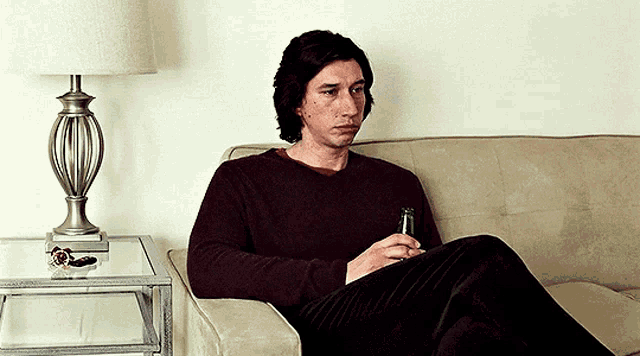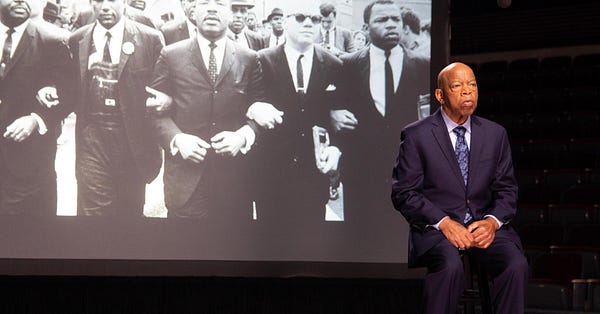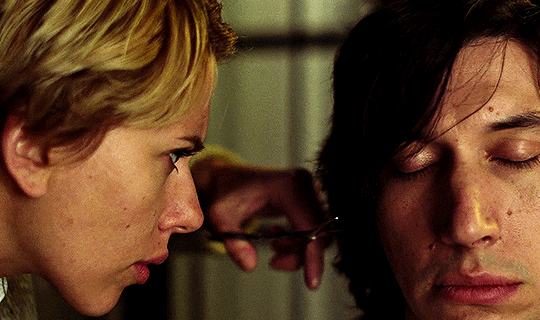Happy Tuesday, friends!

2020 responding to all of our thoughts and plans for this year
A must-listen for those who are using this moment in history to reimagine the role of American institutions — NPR’s Fresh Air talked with psychiatrist Christine Montross about how our prison system contributes to a vicious cycle of worsening outcomes for America’s mentally ill. This section of the conversation really struck a nerve with me, and I hope you contemplate it as well:
Police officers, sometimes in an attempt to provide mentally ill people with treatment, have said things to me: "We know if we take them to jail, they will at least get 'three hots and a cot.' They will at least get their psychiatric medications." And so taking them to jail feels like an act of compassion.
So this idea of a "compassionate arrest" struck me so deeply, because we would never do something like that for someone to make sure that someone received their treatment for diabetes. We would never arrest someone to make sure that they received treatment for their cancer. We only do that in this situation of the mentally ill, and that, to me, seems like a travesty.
I don’t presume to know the politics of everyone who subscribes. But for anyone who might want to watch John Lewis: Good Trouble and might want to elect other Democrats on the ballot, the group Run for Something (which recruits the next generation of young elected leaders) has a revenue-split to stream the movie with the studio!
⬇️More details below ⬇️


Forgot to include this yesterday, but fans of The Parent Trap, rejoice! Nancy Meyers and the gang have blessed us with this reunion special on Katie Couric’s Instagram. It was genuinely sweet to 1) see that Lindsay Lohan is alive and seemingly functioning and 2) her re-enact the car ride back to Napa talking about the meaning of the word “dad” with Dennis Quaid.
And, as always, a reminder that my employer is matching donations to a number of justice-oriented organizations (all of which are listed and described in this nifty spreadsheet). Make your money go twice as far by noting your organization of choice in a Venmo payment (@marSHAffer). Should I play “The Final Countdown,” Gob Bluth style, now that we’re approaching the last $100?
Now, what you came for…

DAY 131: Marriage Story (available on Netflix)
I realize that it’s rich irony that I, who am literally on the “Know Your Meme” page for the Marriage Story fight scene, would come to you making the case that the film is about more than just the explosive argument. (The tweet is my final word on whether the movie “takes sides” between its two leads.) But … it is. And now that the film is getting a fancy Criterion Collection physical release, it’s the perfect time to reflect on how this more than just a vehicle for memes and Laura Dern’s Oscar.
If you’re familiar with Noah Baumbach’s other movies apart from his work with now-partner Greta Gerwig (The Squid and the Whale, Kicking and Screaming, The Meyerowitz Stories), you might know that he doesn’t always hold his fellow humans in the highest estimation. Baumbach’s humor is routinely among the most caustic of his contemporaries, but he scripts the acid-tongued bickering with such an acute eye for behavior that his poison pills become palatable to swallow. We can dispute the conclusions or the worldview he arrives at, though it’s tough to point to single moment as ringing hollow or untrue.
Something changed — dare I say, matured — for Baumbach in Marriage Story. There’s a generosity of spirit here, a humanism and genuine affection for the characters on screen. There’s plenty of enmity slung between Scarlett Johansson’s Nicole and Adam Driver’s Charlie as their marriage dissolves into a bitter legal and custody dispute. Yet the overwhelming focus of the film is not the venom but the wound left behind. After all, the film’s centerpiece confrontation, a scene of escalations that devolve into yelling and personal attacks, ends not with one character pulling out the conversation-ending diss and winning. It’s Charlie broken down in tears, on his knees, sobbing into Nicole’s knees as they share a moment of shared pain over what divorce has made them become.
For how startlingly common divorce is in our world, there are very few films centered around the experience. Baumbach, free of some of the acerbic and ironic tendencies that define his (stellar) body of work, provides what is debatably the best divorce movie to date. At the very least, it’s the most complete. Marriage Story captures the many contours of this life-altering event from dimensions economic and emotional, personal and professional. The dissolution of the union between Charlie and Nicole unfolds chronologically, but the strange and delayed echoes of their experiences coming to terms with what is lost and looking ahead towards a different future makes for an unexpected journey. Driver and Johansson give their all so that their characters reflect the full spectrum of feeling: sad, angry, terrified, tender, grateful.
Even though we know where the train is headed, I don’t think Marriage Story is at all a depressing or enervating experience. If you care only that the nuptial arrangement is upheld and not at all for the health and well-being of the people within it, then maybe you’d feel differently. Baumbach makes it pretty clear that Charlie and Nicole’s marriage cannot work in the circumstances he presents, though the film’s gentle tragedy is that he also shows glimpses of how it could be a sustaining partnership. The duo share so much that makes them compatible, yet each’s trajectory towards self-actualization zig-zags through the others. They never quite align even though they’re usually headed the same direction, something the film shows us in sneakily clever parallels. (Take, for instance, each singing a song from Company in two scenes positioned directly after one another — but unbeknownst to the other.)
And while they’re having these grand realizations about what they want out of life, Baumbach gives us quite the contrast as both must endure meat-grinder of the divorce-industrial complex. This is a world concocted with pettiness, manipulation and mundanity … then spun in a Kafkaesque bureaucratic blender. If there’s any bile in Marriage Story, it’s reserved for the divorce attorneys like Laura Dern’s Nora Fanshaw and Ray Liotta’s Jay Marotta, two power players who milk money from the misery of pitting sparring exes against one another. The odd humor of these scenes makes for an interesting but welcome juxtaposition to the film’s profound dramatic core. It’s a bit of a cliché to describe the multitudes of a film like Marriage Story as approximating the random charms of life itself, yet this tender tale of how people strive to feel fully alive earns such superlative description.
P.S. — Some of the description of the film was taken from my top 10 list of 2019 because, well, this film was obviously on it.
Be good to yourselves and to each other,
Marshall




